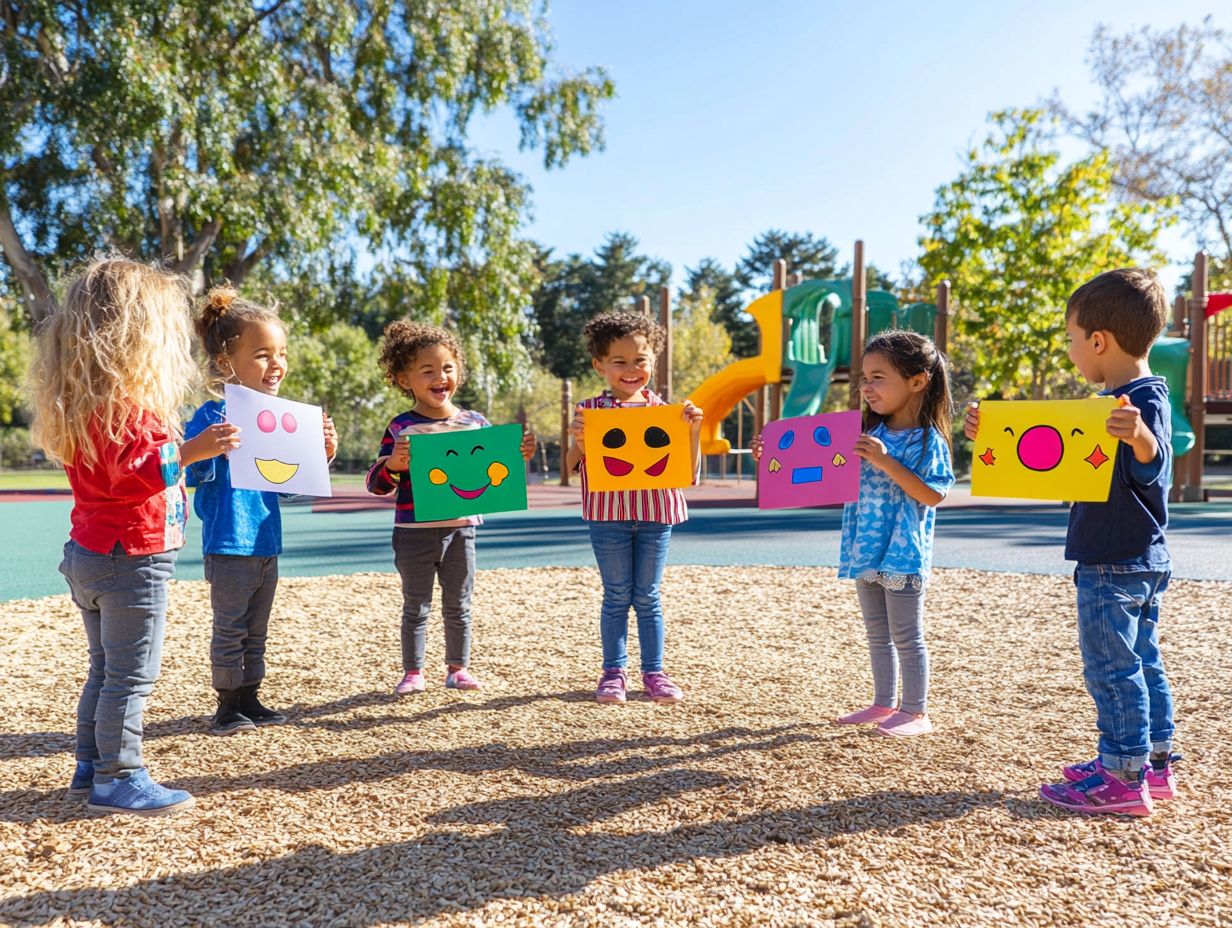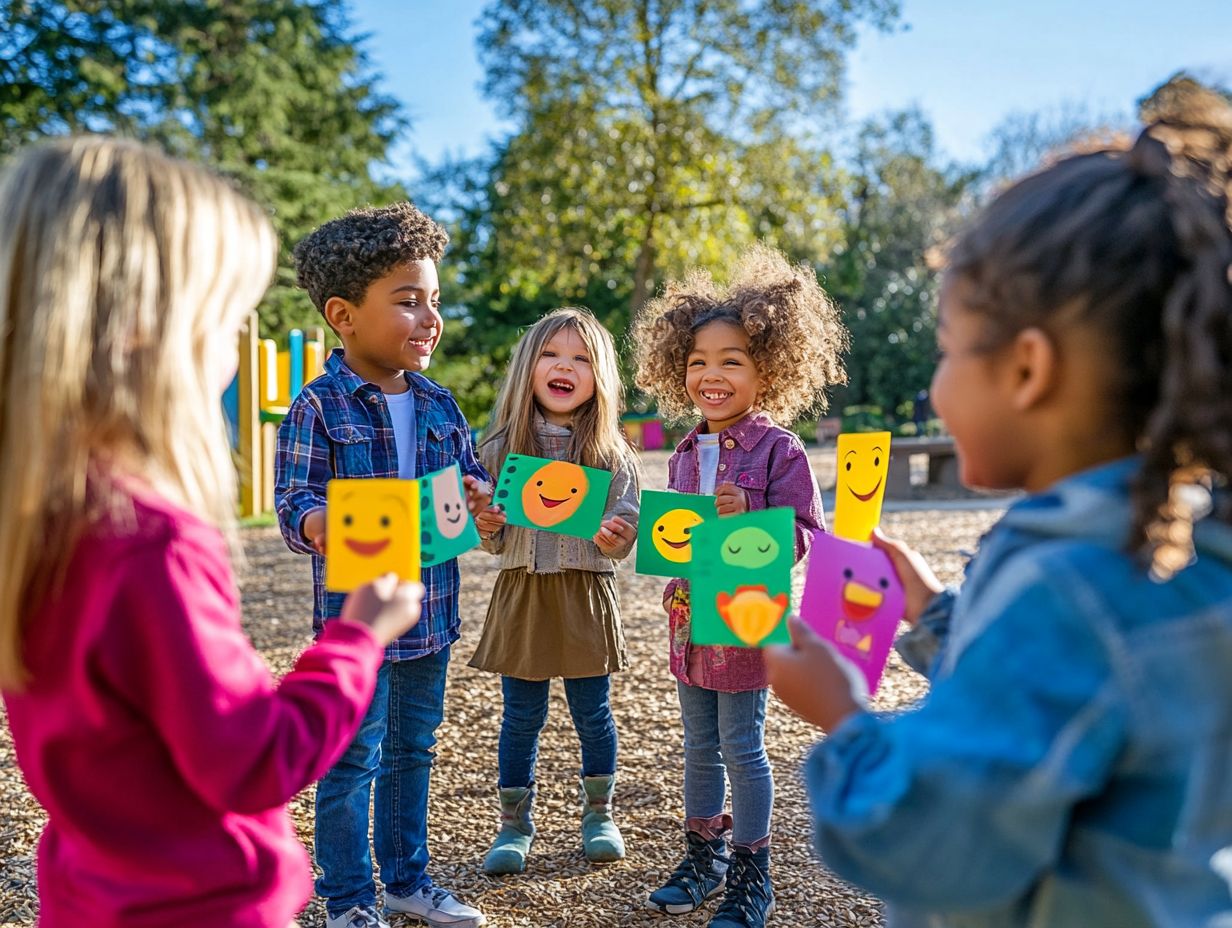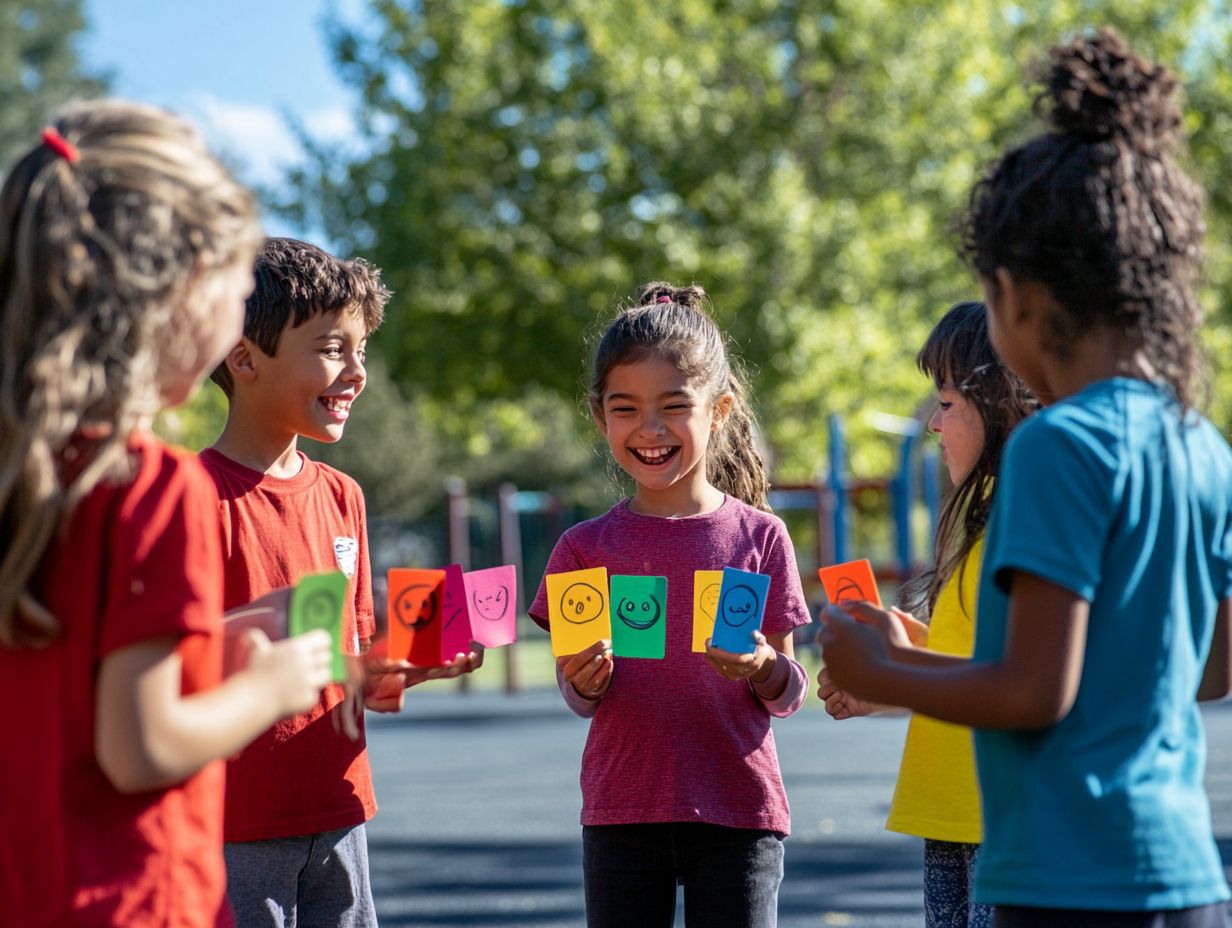5 Fun Activities for Building Emotional Awareness
Emotional awareness is an essential skill that empowers you to navigate your feelings. Cultivating this awareness significantly enhances your relationships and fosters personal growth. This foundation supports the ability to understand and manage your feelings, which is crucial for personal and professional success.
Dive into five exciting activities mindful coloring, journaling prompts, role-playing scenarios, guided meditation, and creating a vision board that transform your journey of emotional discovery into an enjoyable experience. These activities build your emotional vocabulary and empathy skills, fostering positive interactions and emotional growth.
Uncover the numerous benefits of emotional awareness and discover practical tips for seamlessly integrating these practices into your daily life. By engaging in emotional activities, you can enhance your ability to manage feelings and develop strong emotional connections. Start your journey today and unlock the power of emotional awareness!
Contents
- Key Takeaways:
- 1. Mindful Coloring
- 2. Journaling Prompts
- 3. Role-Playing Scenarios
- 4. Guided Meditation
- 5. Creating a Vision Board
- What Is Emotional Awareness and Why Is It Important?
- What Are the Benefits of Building Emotional Awareness?
- How Can These Activities Help with Emotional Awareness?
- What Are Some Other Activities for Building Emotional Awareness?
- How Can One Incorporate Emotional Awareness into Their Daily Life?
- What Are the Common Challenges When Building Emotional Awareness?
- Frequently Asked Questions
- Engaging Activities for Building Emotional Awareness
- What are 5 fun activities for building emotional awareness?
- Why is building emotional awareness important?
- Can these activities be done alone or with others?
- Do I need any special skills or tools for these activities?
- How often should I engage in these activities?
- Are there any age restrictions for these activities?
Key Takeaways:

- Engage in mindful coloring to calm the mind, reduce stress, and increase emotional awareness. This activity can help learners recognize and articulate their feelings.
- Journaling prompts help identify and articulate emotions, leading to a better understanding of oneself and others.
- Role-playing scenarios provide a safe space to practice expressing and managing emotions in a controlled environment, enhancing emotional settings where self-management and understanding thrive.
1. Mindful Coloring
Mindful coloring is an engaging emotional activity that nurtures your emotional awareness. It invites you to explore your feelings and enhances your emotional expression. This ultimately contributes to a healthier classroom culture where you and your peers can recognize and articulate your emotions effectively. Teachers like Kathy Perez recommend incorporating such activities into regular routines to support emotional development.
Through this creative outlet, choose coloring themes that resonate with your emotions perhaps vibrant sunrises that evoke happiness or deep ocean blues that reflect sadness. By selecting colors and patterns that connect with your current emotional state, you practice emotional self-awareness, refining your ability to identify and manage your feelings. Using tools like the feeling wheel can enhance this process by providing a visual representation of various emotions.
This mindful approach fits into emotional check-in sessions, where you color in response to prompts about your day. You engage in meaningful dialogue around your emotional vocabulary and feeling words. For instance, if you are drawn to fiery reds, you might explore feelings of anger or frustration, creating a space for reflection and open communication. This process not only enhances your emotional literacy but also fosters a supportive environment for everyone involved.
2. Journaling Prompts
Journaling prompts are a powerful tool for enhancing your emotional awareness and self-understanding. They allow you to reflect on your feelings and engage in meaningful expressions that enrich your understanding of emotions. By incorporating emotional reflections and assessments, you contribute to your personal development and emotional health.
These prompts manifest in various ways, from straightforward questions about your daily experiences to guided reflections inviting you to delve deeper into personal values and emotions. For example, prompts that encourage you to recount a moment when you felt proud or disappointed can unlock profound insights.
Through these reflective practices, you articulate your feelings and learn to manage them effectively. Integrating journaling into your daily routine fosters a supportive environment where emotional literacy can thrive, guiding you toward healthier self-management and more fulfilling relationships. Emotional assessments can help track your progress and highlight areas for further growth.
3. Role-Playing Scenarios
Engaging in role-playing scenarios offers you a vibrant avenue to cultivate empathy and emotional understanding. As you participate in these activities that mirror real-life situations, you enhance your social awareness and communication skills. Role play can be a part of emotional learning experiences that promote empathy and understanding in various settings.
These interactive exercises invite you to step into different roles, encouraging a broader perspective on the world around you. For example, in a classroom setting, you might find yourself acting out conflict resolution scenarios, where you practice addressing disagreements while exploring your own emotions and those of others. Such activities can be part of classroom guidance programs designed to improve emotional strategies and classroom culture.
In the workplace, role-playing can simulate customer interactions, equipping you with patience and problem-solving skills. This kind of experiential learning not only hones your interpersonal abilities but also fosters essential traits like compassion and resilience, both of which are invaluable in academic settings and professional careers.
4. Guided Meditation

Guided meditation serves as a remarkable tool for enhancing emotional health and self-management, enabling you to cultivate mindfulness and foster positive emotions while deepening your emotional awareness and overall well-being across various contexts. Emotional conversations during meditation sessions can further enhance this practice.
In classroom settings, you can effortlessly weave techniques such as breath-focused meditations, visualizations, or body scans into the daily routine. These practices not only help you build emotional resilience but also enable you to manage anxiety more effectively, sharpen your concentration, and nurture a sense of community among peers. Using a learning toolbox like The Social Emotional Learning Toolbox by Kathy Perez can support these practices.
By incorporating brief meditation sessions before lessons or during breaks, educators can create a tranquil environment that promotes emotional expression and regulation.
With consistent engagement in these practices, you may discover an enhanced ability to navigate your emotions, ultimately leading to improved academic performance and stronger interpersonal relationships.
5. Creating a Vision Board
Creating a vision board is an inspiring emotional journey that invites you to visualize your goals and aspirations. This practice nurtures emotional growth and self-improvement by allowing you to articulate your awareness and desires through creative expression. Engaging in this activity can boost your motivation and self-awareness.
Not only does this process help you define clear objectives, but it also offers you a tangible way to explore your feelings, bringing your dreams to life through images and words. As you select visuals that resonate with your emotional state, you become more attuned to your motivations and hopes, turning this activity into a powerful reflective exercise. Vision boards can serve as a springboard for emotional conversations and deeper emotional connections with others.
In an educational context, incorporating vision boards into the classroom can significantly enhance student engagement. It encourages meaningful group discussions about personal aspirations and the sharing of experiences. Educators can facilitate workshops where students collaborate on their vision boards, fostering a sense of community and support while also enhancing emotional intelligence among peers. Such classroom activities promote emotional development and positive classroom culture.
What Is Emotional Awareness and Why Is It Important?
Emotional awareness is your ability to recognize, understand, and manage your emotions. It s fundamental for developing emotional intelligence (the ability to understand and manage emotions), building understanding, and enhancing your overall emotional well-being in both personal and community contexts. Experts like Daniel Goleman and Salovey and Mayer have highlighted the importance of this skill in emotional settings.
This skill is essential in various facets of life, particularly in educational and workplace settings where effective communication and collaboration reign supreme. In educational environments, students who cultivate strong emotional awareness are often better prepared to cope with stress, engage in cooperative learning, and foster supportive relationships with their peers and teachers. Emotional learning and guidance in schools help students develop key character traits and improve emotional challenges.
The same applies to the workplace: individuals who possess a high level of emotional awareness can adeptly navigate complex team dynamics, enhance their leadership skills, and contribute to a more inclusive atmosphere. Effective feelings management and communication skills are crucial for team collaboration and cohesion.
Emotional awareness significantly boosts self-awareness, allowing you to analyze your emotional patterns and responses. This, in turn, strengthens your interpersonal relationships by promoting empathy and understanding among colleagues and friends. Engaging in emotional reflections and assessments can provide deeper insights into your emotional experiences and growth.
What Are the Benefits of Building Emotional Awareness?
Building emotional awareness offers a wealth of benefits, including enhanced emotional intelligence, improved self-management, refined empathy skills, and the capacity for engaging in positive interactions with others. This ultimately leads to healthier relationships and better emotional well-being.
Improved Relationships
Imagine the power you would have if you could easily recognize when you’re feeling overwhelmed. This awareness allows you to communicate your needs more effectively to friends or colleagues. It’s a skill that not only promotes better dialogue but also diminishes the likelihood of misunderstandings that often escalate into conflicts. Emotional conversations and feelings expression can be key strategies in managing these situations.
Personal Growth
When you’re in tune with your own emotions, you can respond more empathetically to others, paving the way for deeper connections and ensuring your support is both relevant and timely. Picture a scenario where a team member is visibly stressed out during a project deadline. By practicing emotional awareness, you might step in with understanding, offering assistance or adjusting workloads. This thoughtful intervention fosters a more cohesive work environment and bolsters team morale. Effective emotional strategies in team dynamics can significantly improve overall workplace harmony.
How Can These Activities Help with Emotional Awareness?

Engaging in structured emotional activities is essential for enhancing your emotional awareness. These activities offer practical opportunities to delve into your feelings, manage your emotional responses, and cultivate empathy through interactive learning experiences. Resources like The Social Emotional Learning Toolbox can provide valuable insights and tools for these activities.
Consider specific activities like mindful coloring, which allows you to immerse yourself in a creative process that encourages reflection on your emotions. Journaling can become your powerful ally in articulating your thoughts and gaining insights into your feelings. Role play invites you to explore diverse perspectives, deepening your empathetic connections with others. Guided meditation creates a calming environment that fosters self-discovery, helping you identify and navigate your emotional landscape, thus enhancing your emotional self-management. Additionally, you might explore 5 emotional awareness games for the family to engage in fun, meaningful activities together.
Creating vision boards enables you to visualize your aspirations and emotional goals, strengthening the connection between your inner experiences and external realities. These emotional strategies not only support your engagement in these activities but also facilitate a deeper understanding of your emotional journey, contributing to your overall emotional health and self-awareness.
What Are Some Other Activities for Building Emotional Awareness?
Along with the activities mentioned earlier, you have a wealth of engaging classroom options that can significantly enhance emotional awareness. These activities invite you to explore your feelings and foster emotional development in various ways.
Take emotional check-ins, for instance. They re invaluable moments where you can share how you feel at the beginning or end of a session, cultivating an atmosphere of openness and trust.
Team-building exercises also play a vital role. They encourage collaboration and create a sense of camaraderie, allowing you to express your emotions while working collectively toward common goals. This, in turn, improves team dynamics and team cohesion.
Engaging in emotional conversations, whether through guided discussions or role-playing scenarios, offers you a safe space to express your feelings and empathize with others. These activities are essential in nurturing emotional intelligence and empathy. They equip you to recognize your emotional states and respond thoughtfully to the emotions of those around you, enhancing your communication skills and emotional understanding.
How Can One Incorporate Emotional Awareness into Their Daily Life?
Incorporating emotional awareness into your daily life requires a commitment to self-management techniques, active engagement with emotional strategies, and ongoing reflection on your emotional experiences. This practice fosters a deeper understanding of your feelings and reactions, contributing to your self-improvement and emotional growth.
Start your journey today by scheduling regular emotional check-ins throughout your day perhaps during your morning routine or evening reflections. This simple practice can anchor you in your current emotional state.
Using tools like a feeling wheel can also be immensely helpful; it aids in identifying and expressing complex emotions with greater clarity, enhancing your communication with yourself and others by expanding your emotional vocabulary.
Practicing empathy in your everyday interactions nurtures understanding and support, ultimately fostering stronger connections. Set aside time for emotional self-reflection through journaling or meditation to gain valuable insights into your emotional patterns and triggers. This practice significantly enhances your overall emotional intelligence and self-awareness.
What Are the Common Challenges When Building Emotional Awareness?
Building emotional awareness presents several common challenges, such as the struggle to express feelings, a limited emotional vocabulary, and barriers to understanding emotions. These obstacles can hinder your personal growth and development.
Such challenges can make it difficult for you to connect with your own emotions or share them with others. To navigate these obstacles, consider seeking emotional support from trusted friends or mental health professionals who can offer valuable guidance and encouragement.
Engaging in practices like journaling can be beneficial, as it allows you to reflect on your emotions and enhance your self-awareness. Participating in workshops or groups focused on emotional learning can help expand your emotional vocabulary, fostering a deeper understanding of both yourself and those around you, thereby improving your overall emotional intelligence.
Watch this video to learn more about emotional awareness and practical strategies for development.
Frequently Asked Questions

Engaging Activities for Building Emotional Awareness
What are 5 fun activities for building emotional awareness?
1. Journaling: Writing down your thoughts and emotions can help you become more aware of them. This enhances your self-awareness and emotional awareness.
2. Mindful Coloring: Coloring can be a soothing and meditative activity. It allows you to explore your emotions through creativity, contributing to your feelings management.
3. Role-Playing: Acting out different scenarios can help you understand both your own and others’ emotions. This fosters empathy skills.
4. Music Therapy: Listening to music can evoke various emotions. It helps you become more in tune with your feelings, promoting emotional connection.
5. Outdoor Activities: Going for a walk or hike can release pent-up emotions. Engaging in physical activities also improves overall emotional well-being, contributing to positive handling of emotions and emotional health.
Why is building emotional awareness important?
Building emotional awareness improves our ability to understand and regulate our emotions. This leads to enhanced mental and emotional well-being.
It enriches our communication skills, enhances our social awareness, and contributes to healthier relationships in personal and classroom settings.
Can these activities be done alone or with others?
These activities can be enjoyed both alone and with others. It depends on your preferences and comfort level.
Do I need any special skills or tools for these activities?
No special skills or tools are required. These activities are simple and accessible for anyone.
How often should I engage in these activities?
It is recommended to engage in these activities regularly. Aim for at least a few times a week to see benefits and build emotional awareness over time.
Regular engagement fosters emotional growth and self-improvement.
Are there any age restrictions for these activities?
These activities can be enjoyed by people of all ages. However, some may be more suitable for certain age groups.
It is important to choose activities that are appropriate and enjoyable for you.






